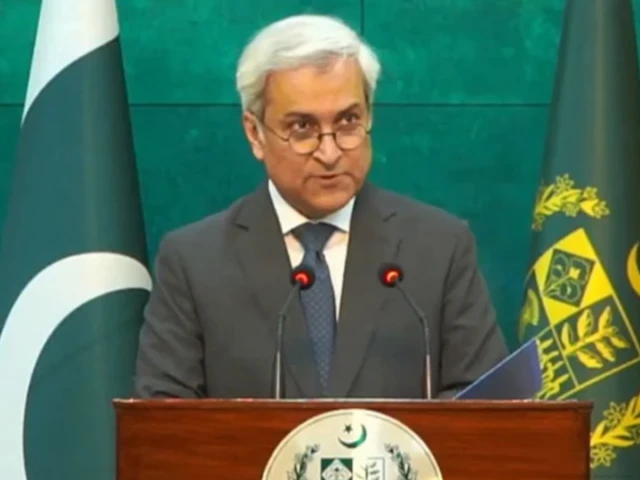ISLAMABAD/PAKISTAN:
Turkish and Qatari mediators continue their discussions with the Afghan Taliban delegation over Pakistan’s demands to end cross-border terrorism, as efforts intensify to reach an agreement before the planned conclusion of the ongoing talks.
At the weekly press conference on October 17, 2025, Foreign Ministry spokesperson Tahir Hussain Andrabi said Pakistan presented its case to the mediators “in a comprehensive, evidence-based and logical manner.”
🔴LIVE: Weekly press briefing by the spokesperson on 07/11/2025 at the Ministry of Foreign Affairs, Islamabad
— Ministry of Foreign Affairs – Pakistan (@ForeignOfficePk) November 7, 2025
The two-day negotiations, taking place under restricted media access at Istanbul’s Conrad Hotel, constitute the third round of engagement between Islamabad and Kabul after last month’s deadly border clashes. The two countries’ intelligence chiefs lead their camps, with talks aimed at establishing a framework for monitoring and verifying counterterrorism commitments.
Read: Istanbul marathon negotiations seek to break deadlock
“The Pakistani delegation submitted its well-founded, justified and logical demands to the mediators, with the sole aim of ending cross-border terrorism,” Andrabi said.
“The mediators fully endorsed Pakistan’s position based on the evidence provided by our sides, as well as the principles and principles of international law.”
He added that the mediators were discussing Pakistan’s demands point by point with the Afghan delegation. Sources called the progress “encouraging,” although an agreement on a verifiable crackdown on terrorist groups remains elusive, and officials said negotiations could be extended if necessary.
Previous border clashes and rounds of negotiations
The current round follows weeks of shuttle diplomacy after border clashes between October 11 and 15, which brought relations to their lowest point since the Taliban seized power in 2021. Hostilities began when militants reportedly attacked Pakistan from Afghanistan on October 11, following Taliban allegations of Pakistani airstrikes on Afghan territory.
After the first skirmish, numerous clashes took place along the border, including strikes on camps in Afghanistan. A 48-hour ceasefire was agreed on October 15, paving the way for dialogue. During a brief exchange of fire at the Chaman-Spin Boldak border crossing, two people, including a woman, were killed, testing the fragile truce.
Pakistan had urged the Afghan Taliban to disassociate itself from the banned Tehreek-i-Taliban Pakistan (TTP) and take concrete measures against anti-Pakistan elements operating from Afghan territory.
Islamabad has asked Kabul for a clear decree, explicitly committing to distance itself from the TTP. Mediators would strive to reach a balanced agreement, with potential areas of convergence including counterterrorism cooperation and border security protocols, although distrust and Kabul’s ambiguous position on the TTP continue to pose challenges.
Learn more: Make-or-break talks: Pakistan, Afghan Taliban to meet in Istanbul today
Since the clashes, representatives of Pakistan and the Afghan Taliban have held two rounds of talks – first in Doha and then in Istanbul. Although temporary ceasefires were maintained, no final agreement was reached.
After the runoff, Information Minister Attaullah Tarar tweeted on October 29 that the negotiations “did not result in any viable solution,” adding that Pakistan would continue to protect its citizens from terrorism.
Mediators from Turkey and Qatar intervened by issuing a joint statement on October 31, saying that “further implementation modalities will be discussed and decided” at a main-level meeting in Istanbul on November 6. Delegations arrived in Istanbul on Wednesday for the third round, which began yesterday, surviving the brief cross-border outbreak.
In an earlier press briefing, the Ministry of Foreign Affairs had dismissed the remarks of the acting Afghan foreign minister during his visit to India, calling them an attempt to divert attention from terrorist sanctuaries on Afghan soil. The spokesperson reiterated that Pakistan’s border operations in October were defensive, targeting only militant infrastructure, and noted that the 48-hour ceasefire from October 15 had allowed space for dialogue.
FO also criticized the references to Jammu and Kashmir in the India-Afghanistan joint statement of October 10, calling them a “violation of UN Security Council resolutions and an affront to the sacrifices of the Kashmiri people”. The spokesperson recalled that Pakistan has hosted nearly four million Afghan refugees for decades, while reaffirming its vision of a peaceful and stable Afghanistan.




